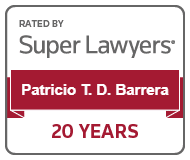Past crimes are not a basis to throw out an employment lawsuit in California

Discrimination is discrimination, no matter who it is perpetrated against.
When an employer is faced with an allegation of wrongful discharge, employment discrimination, or other wrongdoing, some have historically had the tendency to root around for any information that can let them off the hook. This includes information on whether an employee or applicant broke the law prior to becoming employed or denied a promotion. This legal doctrine is “after-acquired evidence,” and led to some employees fearing to report discrimination because of a criminal record or to assume they didn’t have a case.
The California Supreme Court put an end to that practice last year.
In Salas v. Sierra Chemical Co., the Supreme Court held that even if an employee hires a worker without current legal documentation to be in the U.S., that employer cannot discriminate against those workers. Whether or not the employee was guilty of a previous crime, employers do not have the right to break the law themselves.
Fortunately, California courts no longer consider the criminal history of an employee or applicant relevant to a discrimination claim if the employer did not use that information when making its decision. Whether discrimination occurred does not depend on a particular worker’s history. If the employer discriminated against a protected class, that employer broke the law, and the employee has a valid claim.
Recent case reaffirms position of California courts.
The Supreme Court’s decision set a precedent which was recently followed by the California Court of Appeals. In that case, an African-American union member sued the organization for race discrimination following his rejection as a labor organizer, when the position twice went to a Caucasian male. It was later revealed that the member had a previous narcotics conviction for which he served time in jail. This conviction would have prevented him from obtaining a labor organizer position under federal law.
The key in this case, however, is that the union had no knowledge of the conviction when it rejected his application for the position. Therefore, even though the applicant was not able to obtain the position, what mattered was the intent of the union when it denied the applicant. If that rejection was based on race, then it was in violation of state and federal law.
California law prioritizes ending discrimination. Holding employers accountable for their actions means basing a case on its own merits, not on the history of the person who was adversely affected because of discrimination.
If you are part of a protected class and have experienced employment discrimination, contact Barrera & Associates. Our team has experience representing employees who have been discriminated against and are tireless advocates for employee rights in California.
Keywords: Employment discrimination, California, criminal background.





